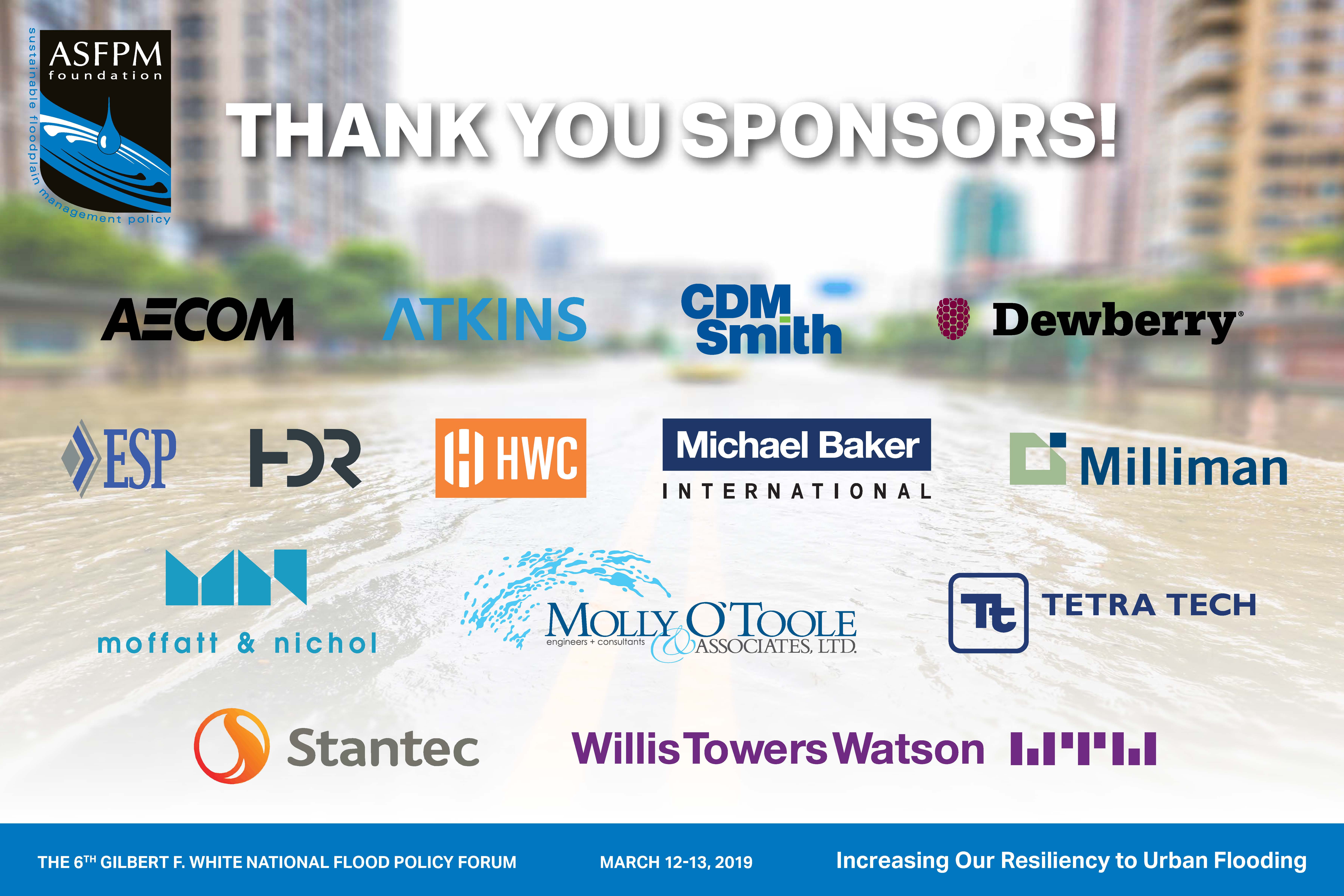Gilbert F. White National Flood Policy Forum (2019)
Increasing Our Resiliency to Urban Flooding
On March 12-13, 2019, the ASFPM Foundation will host a two-day policy forum in the Washington, DC area to address urban flooding. The high-level question the forum will seek to answer is:
How can we be better equipped as a nation to deal with
rapidly increasing flood risk in urban areas?
rapidly increasing flood risk in urban areas?
Across the United States, communities and states are seeing increasingly frequent and debilitating instances of urban flooding. Traditional approaches to floodplain management often will not work for high population, densely invested areas. The ASFPM Foundation Board believes that addressing urban flooding represents one of the most significant and complex challenges facing flood risk management policymakers and practitioners today. The nation needs to consider integrated approaches that take into account not only physical, but social, economic and political impacts, in a planning context marked by increasing uncertainty due to a changing climate. The decisions made now and over the next two decades will profoundly affect our nation’s ability to manage flood risk, recover from flooding, and invest at a national, regional and local scale in structural and nonstructural approaches to managing flood risk.
BACKGROUND
Across the United States, communities and states are facing challenging issues surrounding urban flooding, including:
- Higher intensity, more frequent rainfall
- Increasing impervious surfaces (due to population growth and development)
- Aging infrastructure
- Sea level rise
- Water quality decline
- Disruption of the natural water cycle
- Insurance coverage
- Risk identification and communication
Over the past 15 years, coastal storms and hurricane-driven events have become ever larger and more frequent. For coastal communities, the combination of more intense, extreme hurricane-driven rainfall and sea level rise has resulted in a dual urban flooding threat, bringing devastating impacts to facilities, resources, economies and lives. Localized flooding events of massive proportions have also hit inland. In addition to numerous historic floods, smaller rainfall events are also significantly impacting many urban areas. Older parts of cities, in particular, are vulnerable to flooding from these higher frequency events. The flooding that takes place often occurs outside of the floodplains typically identified by the National Flood Insurance Program.
Four recent efforts are providing new data and insights regarding urban flooding and its consequences:
- Tasked by the Illinois General Assembly, the Illinois Department of Natural Resources released a report in 2015 on the extent, cost, prevalence, and policies related to urban flooding in Illinois.
- The Center for Disaster Resilience, University of Maryland, and Center for Texas Beaches and Shores, Texas A&M University, Galveston Campus, is conducting a study entitled "The Growing Threat of Urban Flooding.".
- The ASFPM Stormwater Management Committee is developing an urban flooding discussion paper.
- The National Academy of Science (NAS) is currently completing a FEMA-sponsored study entitled Urban Flooding in the United States.
Key conclusions and findings from these papers and reports will help set the forum’s context.
FORUM PURPOSE
To catalyze discussion and action on urban flooding, the ASFPM Foundation will host a two-day policy forum in March 2019. More than one hundred invited experts representing federal, state and local agencies, the private sector, academia and other stakeholder groups will come together to explore opportunities, barriers and challenges, and focus on the policy path forward.
Topics to be examined include:
- Governance (local, state, federal, tribal)
- People (e.g., social impacts)
- Water quality and quantity
- Ecosystems
- Economy (including impacts on private industry, commerce, jobs, etc.)
- Risk identification in an environment of changing risk (including risk communication)
The targeted outcome will be a set of tiered (local, state, tribal, federal, public-private sector) recommendations to increase resilience and drive locally relevant action to prepare for, mitigate against and recover from escalating urban flooding. In particular, the forum will seek to clarify:
- Governance – roles and responsibilities of cognizant agencies at each level of government
- Integration – needs associated with understanding and implementing a uniform policy set for the nation
- Policy and funding adjustments – changes that are required to enable those roles and responsibilities
- Priorities for future action – immediate and long-term
From the forum’s results, the foundation will develop a written report with national policy recommendations. It will be shared widely with the administration, congressional offices, state and local agencies and the many practitioners focused on urban flooding issues.
BACKGROUND READING
In preparation for the forum's discussions, those invited to attend and participate in this event were also invited to submit brief papers with their current thoughts on urban flooding. These papers were provided to all attendees in advance of the meeting with the request that they read these papers in advance of the event.
FOR MORE INFORMATION
To learn more about the ASFPM Foundation Gilbert White Forum series and the 2019 event, please contact the ASFPM Executive Office at 608-828-3000 asfpmfoundation@floods.org, or ASFPM Foundation President Doug Plasencia at dplasencia@moffattnichol.com.
For sponsorship opportunities, please contact the foundation’s Donor Coordinator, George Riedel (george@asfpmfoundation.org) or Fundraising Committee Chair Jeff Sparrow (jsparrow@moffattnichol.com).







